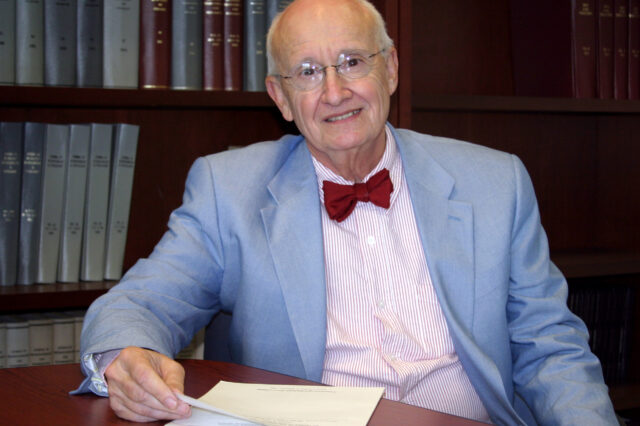UF College of Medicine honors neurologist for life’s work

Kenneth Heilman
The main course was clearly visible on the dinner tray, yet the patient wondered why the hospital only served vegetables.
The puzzle confronted medical internist Kenneth Heilman — today a distinguished professor of neurology at the UF College of Medicine — during a clinical rotation while he was in medical school at the University of Virginia in the 1960s.
"The plate had a partition and the meat was on the left," Heilman said. "He ate all of his vegetables on the right, and he asked why there were never any servings of meat. I thought he must not be able to see on his left, even though tests showed he had full visual fields. He had suffered a stroke of the right hemisphere, and I realized, ‘Wow, this is telling us that there is a part of the brain that allows people to switch attention to one side, and this part of his brain is injured.'"
Experiences like that one helped edge Heilman toward a career in neurology — a career recognized recently through the College of Medicine's 2008 Lifetime Achievement Award.
"The two things I hate the most are death and suffering," Heilman said. "The only way to make war against them is to do research and take care of patients."
The author, co-author or editor of 11 books and more than 500 publications, Heilman has played a part in revealing the parts of the brain that mediate attention and he has helped define the roles of the right and left hemispheres of the brain, often toppling established paradigms of brain function along the way.
"He is known worldwide as one of the fathers of modern-day behavioral neurology and neuropsychology," said Leslie Gonzalez Rothi, Ph.D., the Bob Paul family professor of neurology who nominated Heilman for the Lifetime Achievement Award. "His life's work has been to understand how the brain supports behaviors, what makes us human, and what sets us apart from all other life. He has inspired researchers and literally helped populate the world with experts in behavioral neurology. Those who have been lucky enough to receive his mentorship have been cultivated and given truly the best academic preparation I know of."
Edward Block. M.D., a distinguished professor and chairman of medicine in the College of Medicine, presented the award to Heilman, who joined the faculty in 1970. Heilman was promoted to professor in 1975 and was named the James E. Rooks Jr. professor of neurology in 1998, becoming a member of the first elite group of the faculty to be awarded the title of "distinguished professor."
Edward Valenstein, M.D., chairman of the department of neurology, has known Heilman since they were residents at the Harvard Neurological Unit at Boston City Hospital in the late 1960s.
"He was a year ahead of me, and was my mentor even then," Valenstein said. "He has always been an amazingly creative guy, and a leader in getting other people interested in understanding the brain. There's never been a problem he can't think of a solution for, and there's never been a person he can't find a reason not to support and encourage."
Heilman received his medical degree from the University of Virginia in 1963 and spent two years training in Internal Medicine at Cornell University Medical Center.
During the Vietnam War, Heilman joined the Air Force and was chief of medicine at NATO Hospital, Izmir, Turkey. When he left the service, he accepted a neurology residency and fellowship at Boston City Hospital, before coming to the University of Florida. In 1977, Dr. Heilman joined the Veterans Affairs faculty in a part-time status, first as a staff neurologist and since 1996 as chief of the neurology service.
"People don't enter medicine to receive recognition like this," Heilman said. "We do it because we get joy out of people getting well, students learning things, or being involved in great research. But it is always nice to get a pat on the back. When people you have known for years and years let you know they think highly of you, it's the greatest compliment."
Heilman remains an active clinician, researcher and director of the memory and cognitive disorder clinic.